Angel Face/1952/RKO Radio Pictures/91 min.
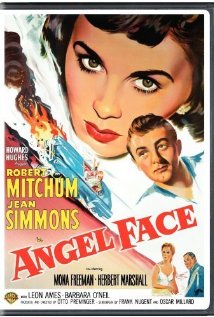 Who in his right mind would bitch-slap an angel? Well, in film-noir, no one is really in his right mind and in “Angel Face” Diane Tremayne (Jean Simmons) isn’t quite what you’d call a cherub.
Who in his right mind would bitch-slap an angel? Well, in film-noir, no one is really in his right mind and in “Angel Face” Diane Tremayne (Jean Simmons) isn’t quite what you’d call a cherub.
No, her heavenly exterior (spoiled but stunningly gorgeous rich girl) masks a demonic core (cold-blooded killer). So when hysterical Diane takes a smack from her beloved Frank Jessup (Robert Mitchum) she hits him right back.
That’s cool for the characters, but I wonder what excuse director/producer Otto Preminger had? When filming the scene, Preminger insisted on repeated takes of Mitchum slapping Simmons.
Fed up, Mitchum slapped Preminger, asking, “Is that how you want it?”
Preminger retaliated by trying to fire Mitchum, but Howard Hughes, the real power behind the movie, refused. Hughes wanted Mitchum and Simmons. He wanted Simmons off-screen as well and made a pest of himself trying to seduce her, no matter that she was married to Stewart Granger.
With Preminger and Hughes harassing her, Simmons was lucky to have Mitchum around to stick up for her – you might even say he was her guardian angel. Maybe Preminger couldn’t handle the pressure; for contractual reasons, the whole film was shot in about 18 days.
The movie was knocked by critics upon its release, but was later ranked by the great French director Jean-Luc Godard as one of the 10 Best American Films of the Sound Era. It’s worth watching on that basis alone. Oh, and then there’s 90 minutes of looking at Mitchum. Mmmm. It’s worth watching on that basis alone.
Here’s the setup: Responding to a medical emergency at the Tremayne home, ambulance driver Frank meets a strange little family, with skeletons aplenty: Diane and her Daddy (Herbert Marshall) enjoy loafing around their roomy mansion and do their best to avoid Dad’s stick-in-the-mud second wife Catherine Tremayne (Barbara O’Neil, who was also Scarlett’s mom in “Gone With The Wind”).
Diane gloms onto Frank, even though he has a girlfriend, the virtuous, slightly bland and aptly named Mary Wilton (Mona Freeman). Frank’s basically a good guy but loyalty isn’t his strong suit. Learning that his dream is to open a garage, Diane convinces her folks to hire him as the family chauffeur; she tells Frank that her indulgent parents might just throw some start-up cash his way.
But when Mumsy suddenly starts getting stingy, Diane decides to arrange a tragic car “accident” for the stuffy Mrs. Moneybags. What could go wrong? Well, Daddy could also get in the car (he does). And Diane and Frank could wind up getting charged with murder (they do).
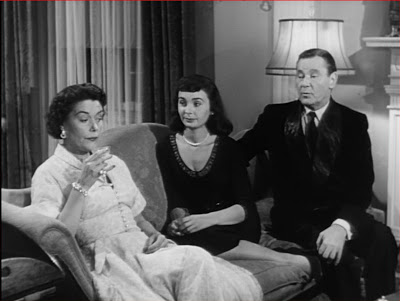
Diane and her Daddy (Herbert Marshall) enjoy loafing around their roomy mansion. Dad’s second wife Catherine (Barbara O’Neil) foots the bill.
Diane doesn’t sweat it, though. She can afford a pricey, clever lawyer Fred Barrett (Leon Ames). Thanks to his legal maneuvering and the legal ineptitude of District Attorney Judson (Jim Backus, yep, that’s Thurston Howell III, aka Mr. Magoo), she and Frank are acquitted.
They’re free, but Frank’s not about to stick around, even though he knows firsthand that Diane has a knack for causing fatal accidents and that she has a way of getting all “If I can’t have him, nobody else can either” about things …
“Angel Face” is not a definitive noir. The camera work and lighting don’t contribute to a sense of doom or create a mood of suspense. There’s far too much sunshine and fresh air here. Dimitri Tiomkin’s romantic music lends lightness as well.
None of that should diminish its standing, however. This quirky flick – which owes a debt to “The Postman Always Rings Twice” (1946) as well as 1945’s “Leave Her to Heaven” and “Fallen Angel,” which Preminger also produced and directed – has flashes of original brilliance: a splendid cast; perfectly symmetrical story structure; an unhurried pace. Frank Nugent, Oscar Millard and an uncredited Ben Hecht wrote the script from a Chester Erskine story.
“Angel Face” shows how noir flexed and began to reinvent itself in the ’50s, reacting less to post-war malaise and more to the conformity and quiet corruption of the 1950s. Note all the references to the power, temptation and ultimate taint of money. Nearly everyone becomes a victim of greed.
The trial scenes, with Preminger’s trademark long takes, prefigure his courtroom drama masterwork, “Anatomy of a Murder” (1959) starring James Stewart, George C. Scott and Lee Remick.
Mitchum is, gloriously, Mitchum. And Simmons makes an unforgettable Eisenhower-era femme fatale: the dangerous, decadent diabolical rich girl. When Godard and Jean Seberg created the treacherous beauty Patricia in “Breathless,” they must have been thinking, at least a little, of Simmons’ Angel Face, the gorgeous girl who got slapped.
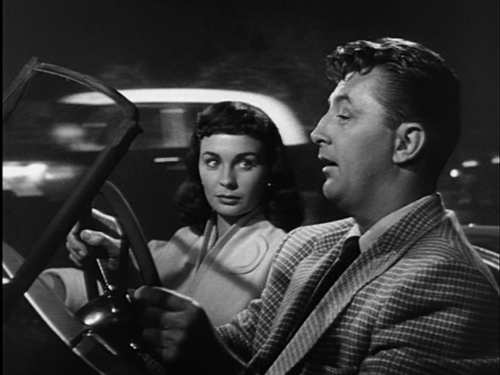





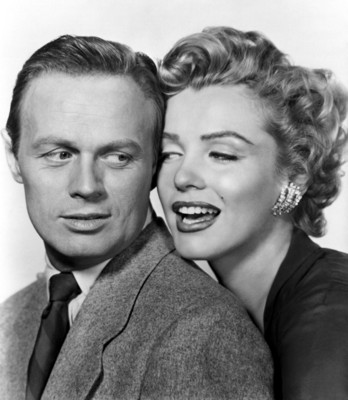
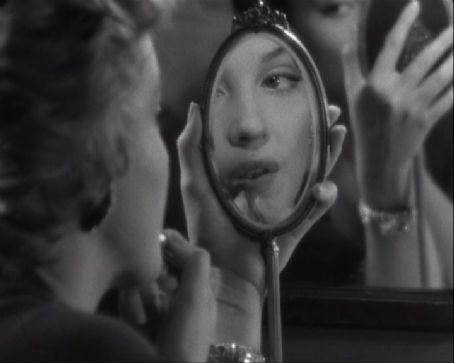





From FNB readers